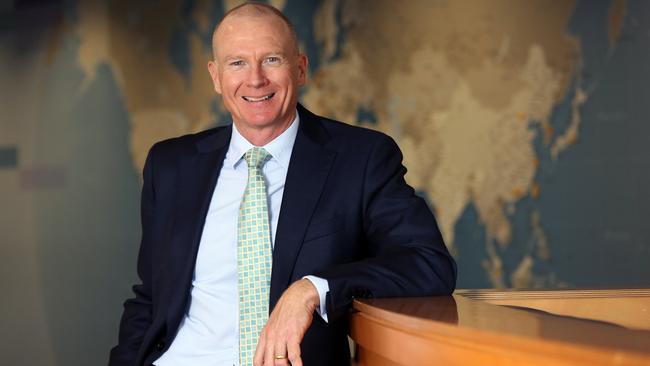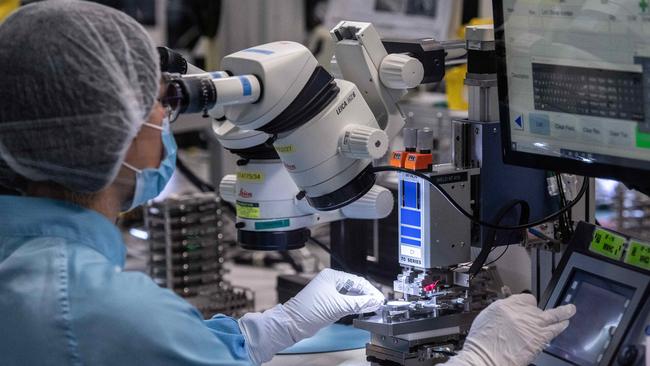Workers understand wage rise and inflation risk, says Cochlear boss as it launches share buyback
Cochlear boss Dig Howitt says its wage bill hasn’t risen in line with inflation and employees understand the economics at play, as Philip Lowe issues a stern warning about big pay rises.

Cochlear chief executive Dig Howitt says the hearing implant maker is adopting a “sensible” approach in setting staff salaries, saying most of its workers understand the risk of runaway inflation if they seek wages to match price increases.
Cochlear shares surged more than 7.7 per cent to $225.28 on Wednesday after it delivered better-than-expected half-year earnings, including record revenue, as it rebounded from the pandemic.
The $14.8bn company is now looking at harnessing artificial intelligence as a way to reduce hearing implant servicing costs over a patient’s lifetime and will buyback at least $75m of its shares. It is also hopeful of sealing a $176m takeover of a smaller Danish rival to propel further growth, despite competition concerns from Australian and European regulators.
It came as Reserve Bank governor Philip Lowe told a Senate committee that he did not know how many more interest rate hikes were needed to rein in inflation, which he said was still “way too high”, and warned workers against seeking bumper pay rises.
“If we end up in the world … where people link wage increases one-for-one with inflation, inflation will persist. And it’ll be more difficult,” Dr Lowe said, adding that Australians had been personally sending him “disturbing letters” about their hardships.
Treasury has upgraded its forecast acceleration in wage growth to 4 per cent versus 3.75 per cent in the October budget. Mr Howitt declined to reveal how much Cochlear’s wage bill - which represents half its overall costs - had risen by but said the company was being “sensible” and its workers were empathetic to that approach.

“There is clearly pressure on wage rises,” Mr Howitt said.
“We haven’t seen wage rises at the level of inflation. I think most people understand what we don’t want is to have inflation spiralling and if wages match or exceed inflation, then there’s a risk of that happening.
“About half our global costs are people. It is very important for us. We manage it carefully and we have very good people and want to retain them. So we‘re sensible about how we approach overall remuneration and the levels of the remuneration and how much it increases.”
But that’s not to say that workers were feeling the pain from the RBA hiking interest rates for nine consecutive months with at least two more rises likely to come.
“There‘s a difference between understanding and wanting more money because people work hard and want more and that’s normal,” Mr Howitt said. “It’s a good thing for people to be aspirational.”
Mr Howitt’s base salary rose 5.5 per cent to $1.95m last year. But his overall remuneration fell 19 per cent to $4.4m following a decline in vested long-term incentive payments on the previous year.
In the past 12 months, Cochlear shares have advanced more than 16 per cent as it regains momentum after implant surgeries were halted during the pandemic. On Wednesday it announced it will buy back at least $75m of its shares this year after its half-year revenue soared 9 per cent to a record $893m.
Cochlear’s board has approved a buyback of up to $135m as part of a strategy to lower its cash balance to $200m.
“The number of shares purchased will be contingent on the prevailing share price and market conditions,” the company said.
“A progressive buy‐back program aligns with the interests of our shareholders by reducing shares on issue, providing gradual accretion in earnings per share and dividends per share over the long term.”
Cochlear will pay an interim dividend of $1.55 a share - in line with last year - on April 14.
While the company generated strong revenue growth, net profit sagged 16 per cent to $142m from higher operating costs.
But Mr Howitt said the higher costs reflected growing investment in research and development and new product launches after a quieter period the previous year.
He maintained guidance of full-year profit growth of 5-10 per cent to $290-305m. Meanwhile, capital expenditure is expected to be around $100m.
“There remains a significant, unmet and addressable clinical need for cochlear and acoustic implants that is expected to continue to underpin the long‐term sustainable growth of the business.”
Mr Howitt said the company was working with the Australian Competition and Consumer Commission about its concerns about the company’s takeover of Copenhagen-based Demant’s hearing implant business, Octicon Medical.
He said hearing aid providers and other treatments for hearing loss were its main competitors rather than fellow hearing implant makers.
“If you look at the number of hearing aids sold each year in the world, it’s well over $10m and the number of hearing implants is probably about 60,000.
“The competition regulators are doing their job. They look at acquisitions and test whether there’ll be a lessening of competition. It’s our role to explain to them how the market for hearing loss works.
“The competition is against these other therapy areas, much more so than just within the narrow realm of implants.”
Demant has also flagged that it wants to exit the hearing implant business, citing the cost of supporting implant recipients throughout their lives. “They’re losing quite a lot of money right now because they just don’t have the scale,” Mr Howitt said.
He said that artificial intelligence could help reduce ongoing servicing costs.
“At the moment our use of AI is pretty limited but there are clearly some significant opportunites here both in terms of how we do work, how we develop products and also the function of our products.
“People have implants with them for life and they depend on them for hearing. They need updating from time-to-time so we see significant opportunities for AI.”
Saul Hadassin, head of healthcare at Barrenjoey, said Cochlear delivered a strong half-year result.
“It’s very consistent with Cochlear’s history of delivering quality results to the market. Robust cochlear implant unit sales reflecting a recovery in elective surgery for implants globally,” Mr Hadassin said.
“They also demonstrated good cost management in what is a high inflation environment, this is reflected in their ability to maintain gross margin at the same levels as the prior period.”




To join the conversation, please log in. Don't have an account? Register
Join the conversation, you are commenting as Logout